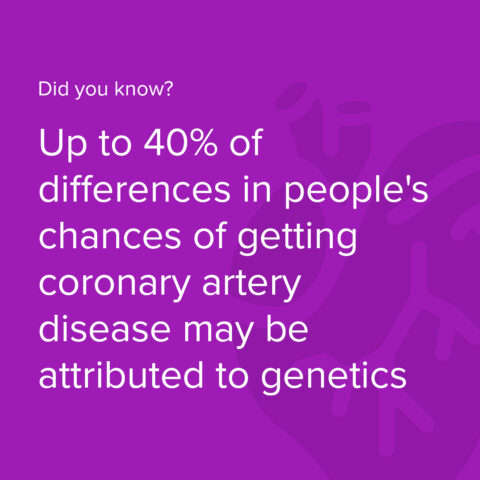
There are many factors that can influence your risk for heart conditions. If you want to know what your risks are, one question you might ask is, is heart disease genetic? The answers lie below.
An Introduction to Heart Disease and Genetics
The short answer to whether any health issue like heart disease is genetic, is yes, of course it is.
You were born with a unique set of DNA that was responsible for forming that heart beating away in your chest. It’s also responsible for how well it works. What other systems in your body may help or hinder it depends as well on how your unique set of DNA put it all together.
Then you grow up, and how you live, what you eat, the air you breathe, all plays itself out on genes, and they respond in kind. It’s a system of what came before, the unique system of you, and the world you live in, coming together in one giant, interactive web.
The question then isn’t whether heart disease is genetic, but how much it is and in what ways? In other words, it’s never a short answer.
Some Facts About Heart Disease
In the US, 1 in 3 deaths from heart disease could be prevented. That’s about 92,000 deaths each year. Imagine if we could save all those lives by striving to prevent heart disease [1]!
Almost 18 million died in 2019 due to heart disease worldwide, which is nearly one third of all deaths [2]! If the U.S. statistic holds true, that means approximately 6 million deaths could’ve been prevented around the world.
According to the CDC, over 18 million adults in the US have coronary artery disease, and the rates keep increasing. However, death rates have been going down. This is likely due to improved diagnosis and treatment [3, 4, 5, 6].
These are sobering statistics, and clearly something that needs to and can be addressed in a number of ways. There’s a reason a third of these deaths are preventable.
What Is Heart Disease?
Heart disease is an umbrella term for a number of conditions affecting the heart, including [7]:
- Blood vessel disease, such as coronary artery disease
- Heart rhythm problems (arrhythmias)
- Heart defects you’re born with (congenital heart defects)
- Heart valve disease
- Disease of the heart muscle
- Heart infection
Coronary artery disease (clogged arteries) is the most common type of heart disease. It affects the coronary arteries — the large blood vessels that feed the heart.
But what causes clogged arteries? Generally, clogged arteries are caused by LDL cholesterol. When your arteries are clogged, they can’t deliver as much oxygen to the heart. Because of this, heart muscle tissue can start to die off [8, 9].
The most drastic result of clogged arteries is a heart attack. If the artery narrows slowly over a long period of time, the symptoms can include chest pain among other problems [8].
Ideally, you never get to this point, because one, you realize your susceptibility, and two, take proactive measures to limit your risks.
Risk Factors For Heart Disease
With so many people affected by a disease, it’s no surprise that it has numerous risk factors involved.
The strongest predictors of getting heart disease within a 10-year time frame are: age, sex, race, total cholesterol, HDL-C, blood pressure, blood pressure treatment status, diabetes, and current smoking status [10].
But of course, the list is longer than that. It also includes [9, 8]:
- Excess weight
- Unhealthy diet
- Stress
- Lack of exercise
- Air pollution
- High cholesterol
- Genetics
Feeling like you may have it already? Modern living is not overly conducive to a low-risk lifestyle. Some of these things are beyond your ability to deal with, unless you’ve figured out how to stop aging, in which case we’d like to talk to you.
Miracles aside, there are many of these factors which are within your control, so it’s important that you be proactive and take steps to be preventative.
To that end, begin at the beginning, your genetics. In what ways is your genetics involved in your risk for heart disease?
Is Heart Disease Genetic?
The list of genes would be huge if we considered all of the potential risk factors for heart disease and what variants might also affect those risk factors. So, we’ll stick with the more direct, most common manifestation of heart disease, and that’s coronary artery disease or “clogged arteries”.
This isn’t to say there aren’t genetic heart conditions, because there are. There are a number of cardiomyopathies that can be inherited, and a DNA test can determine if you have the mutations for those conditions [11].
As it happens, up to 40% of the differences in people’s chances to get coronary artery disease may be attributed to genetics. Genes that may contribute to coronary artery disease influence [12]:
- Fat metabolism (APOE, APOB, LPL, LPA, PCSK9)
- Inflammation (IL5, IL6R)
- Blood clotting (SERPINA1)
- Blood vessel function (NOS3, TGFB1, VEGFA, ANGPTL4)
According to genome studies, looking at thousands of Western Europeans’ DNA, they carry somewhere between 130 and 160 gene locations that are possible risk factors for heart disease!
What can you take from this? Genetics makes a huge difference. Your chances of carrying genetic risk factors for heart disease are high. That’s not a reason to panic, mind you, just information to be aware of.
Some of these factors are going to be more significant than others, but the fact remains. When it comes to heart disease and genetics, the risks are too high to ignore. This is why it’s important to pay attention to those elements of risk that are within your control.
Fortunately, not all is lost. By understanding how genetics and heart disease are connected, there are steps you can take to prevent your heart health from deteriorating in the first place.
The first step in taking control of your risk should be to gain a better understanding of where you’re starting from, and that’s in your DNA.
How Can Knowing Your Genetics Help With Your Heart Health?
The SelfDecode Heart Health report allows you to optimize your health by uncovering what your genes are doing behind the scenes to affect your odds of developing coronary artery disease (CAD).
This may surprise you, but one of the more significant risk factors for CAD actually lies in between your genes! What lies between isn’t just connective bits holding your genes together. Your DNA has bits of code in it that help regulate what the genes do.
In this case, variants in this code may change the activity of genes linked to heart disease and make hardening of the arteries more likely to occur [13, 14].
But when it comes to heart disease and genetics, just knowing your genetic risk factors doesn’t resolve anything other than providing you with knowledge. With SelfDecode, you’ll learn how to counteract these potential risks with health recommendations.
Unlike other DNA companies, SelfDecode goes a step beyond merely highlighting your risk. Your report also comes with evidence-based diet, supplement, and lifestyle recommendations to help you optimize your heart health.
SelfDecode is set apart from other genomics companies by analyzing over 11,000 genetic variants related to heart health to give you the most precise data on your personalized report.
For example, maybe you carry a MTHFR gene variant that has been linked to poor heart vessel health. If that’s your case, trying a Mediterranean diet may prevent fat from clogging up your blood vessels.
Not only are heart disease and genetics connected, but your DNA may influence how well you respond to certain strategies to help you optimize your health.
Conclusion
Now that we’ve clarified the question “is heart disease genetic”, hopefully it will motivate you to address your risks.
Heart disease is one of those things that can creep up on you, like it does with millions of others. Maybe you can shrug off or ignore your symptoms until something catastrophic happens, but you don’t want to be one of those statistics.
If you want to find out what your genetics have to say about your heart health, you should check out SelfDecode. Understanding how genetics and heart disease are connected can give you the advantage you need to get ahead of your health issues.
Related Articles
- What Is A Genetic Mutation?
- Caffeine and Blood Pressure: How Does It Affect Your Heart Health?
- Plant Sterols And Cholesterol: Can It Help Your Heart Health?
- Riboflavin Deficiency, MTHFR, And High Blood Pressure



